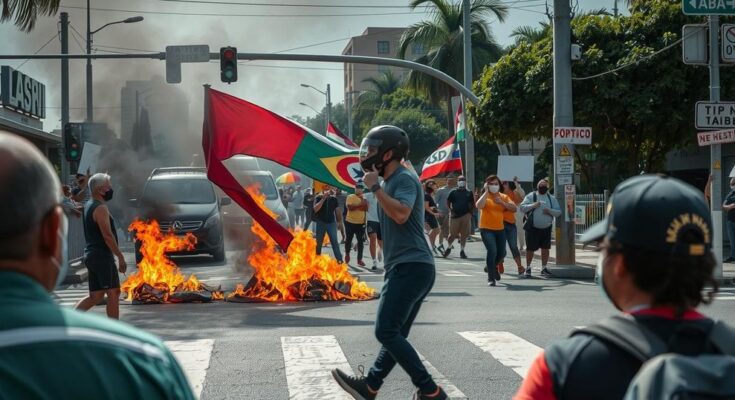Bolivia is experiencing ongoing political protests fueled by tensions within the governing MAS party, led by President Luis Arce and former President Evo Morales. The unrest stems from economic issues, including fuel shortages and rising costs, which mirror the broader discontent across Latin America, with countries like Peru and Colombia also facing significant protests amid governance challenges.
Protests in Bolivia have reached a critical point, continuing for over two months as citizens express their dissatisfaction with the government. The protests reflect not only immediate grievances but also longstanding issues within the Bolivian political landscape, particularly concerning the ruling Movement for Socialism (MAS) party. The political struggle primarily features President Luis Arce and his predecessor Evo Morales, each vying for control and influence ahead of the 2024 presidential elections. Morales, despite his earlier success in elevating poverty levels, now faces serious allegations and declining political capital.
The economic landscape in Bolivia is in disarray, with significant factors such as fuel shortages, rising prices, and a faltering judiciary contributing to public unrest. Citizens have voiced their frustrations over the government’s inability to adequately address these economic challenges while handling ongoing political turmoil. This crisis in Bolivia echoes a broader pattern of instability across Latin America, with neighboring nations such as Ecuador, Peru, and Colombia encountering similar public discontent and protests against their respective governments.
In Peru, President Dina Boluarte suffers from a staggering approval rating and continues to face public outrage fueled by issues including political corruption and economic despair. Colombia’s President Gustavo Petro is likewise embroiled in controversy, as protests against his unpopular reforms highlight growing dissatisfaction among the populace. In Ecuador, violent clashes driven by organized crime have further unsettled the nation, compounding civil unrest.
The implications of Bolivia’s current political crisis may reshape the country’s political scene, especially as it approaches its presidential elections. The dominance of Morales and Arce’s administration faces pivotal scrutiny, and the MAS party is currently the only major player, but the erosion of their influence could open doors to new political movements. Until then, the situation remains fluid and poses significant risks for all involved.
The political situation in Bolivia has become increasingly volatile, particularly as the Movement for Socialism (MAS), a major left-wing party, experiences internal conflict. The tension primarily stems from rivalry between President Luis Arce and former president Evo Morales, who is seeking to maintain relevance against rising dissatisfaction from citizens regarding economic and structural issues. Public outrage is not isolated to Bolivia; neighboring countries are similarly grappling with political instability, marked by protests due to governmental corruption, economic struggles, and public safety concerns. This regional unrest highlights a troubling trend across Latin America.
In summary, Bolivia finds itself amidst profound political turmoil as protests erupt against the backdrop of economic challenges and internal strife within the MAS party. This unrest is reflective of a wider trend in Latin America, where multiple nations are contending with similar issues of governance, public dissatisfaction, and resulting protests. As the 2024 elections approach, Bolivia’s political future appears uncertain, with potential shifts in power dynamics looming on the horizon.
Original Source: www.firstpost.com




